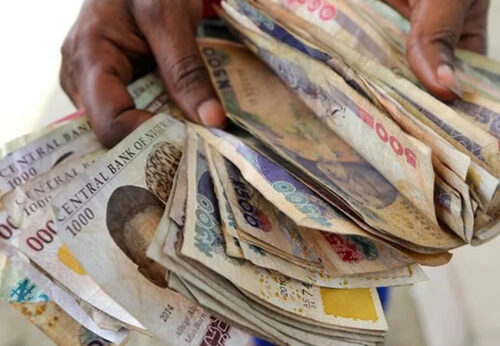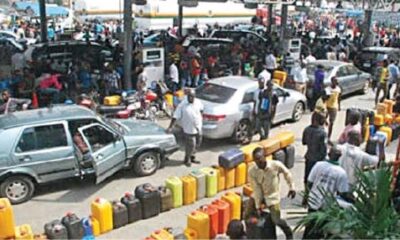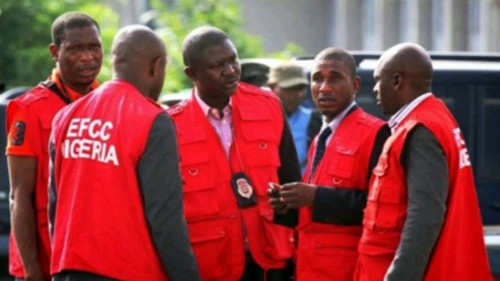The Central Bank of Nigeria on Thursday began the disbursement of old naira notes to Deposit Money Banks as government authorities stepped up efforts to end the biting currency scarcity that has inflicted pain on millions of bank customers nationwide.
The central bank had directed DMBs to pick old N1,000, N500, and N200 notes at its offices across the country for onward disbursements to customers, following a meeting between the CBN Governor, Godwin Emefiele, and bank chief executive officers on Wednesday.
It was gathered that commercial banks got old naira notes from CBN offices across the country on Thursday.
Multiple bank sources including CEOs and top executives confirmed to The PUNCH that the apex bank released old notes to banks.
“I can confirm to you that we received old notes from the CBN today, we also received a memo from the central bank to this effect,” the CEO of a commercial bank said under anonymity.
Also, a general manager at a tier-2 bank told one of our correspondents that the lender got some old notes from the central bank on Thursday.
“The CBN has started giving us old notes. However, it will take some time for the currency to circulate,” a top official of a mid-size bank confirmed on Thursday.
However, top bank officials said it would take about two weeks for the situation to normalize, adding that bank queues might not disappear until later next week.
They also hope to pay N500,000 per customer by next week.
“The situation will not normalise immediately. The impact will begin to be felt on Friday. Overall, things should normalise between one and two weeks,” a top bank executive said under anonymity.
Bank workers union also said the situation might not normalize immediately.
Also, the National President, Association of Senior Staff of Banks, Insurance and Financial Institutions, Mr Olusoji Oluwole, said, “Until recently, the volume of the old currency released to banks has been minimal. This coupled with panic withdrawal by customers, and the restriction of daily withdrawal limits by the CBN has caused continued rationing. However, with the announcement yesterday by the CBN to pump more cash into the system, we hope the pressure will ease by next week if the CBN keeps to this promise.”
However, findings by The PUNCH showed that only a few banks began disbursements on Thursday. It was learnt that several bank branches got the funds from the CBN very late. As such, they could not begin the disbursement.
But the CBN has reportedly concluded plans to dispatch a team of officials to monitor compliance on the part of banks.
It was gathered that the apex bank officials would monitor banks in Lagos, Abuja and other cities with a view to enforcing proper disbursement of the old notes collected from the CBN.
Top officials of the bank were said to have been directed to ensure the speedy recirculation of the old naira notes, hence the monitoring exercise.
NLC meets CBN
Delegates from the CBN on Thursday met with Nigeria Labour Congress over the planned protest due to the scarcity of naira notes in the country.
The meeting, which took place at the Labour House in Abuja, was attended by the NLC President, Joe Ajaero, and a deputy governor of the CBN.
The congress disclosed this in a post on its official Facebook page. The post read, “Congress President, Comrade Joe Ajaero, received in audience a delegation of the Central Bank of Nigeria led by the deputy governor.”
The NLC had said it would on Wednesday next week embark on a nationwide strike over the scarcity of cash in the country. Ajaero gave the directive during a media briefing in Abuja.
When asked by one of our correspondents on Thursday evening if the strike would still go ahead despite the meeting with the CBN officials, Ajaero said, “The strike will hold until the situation in the country normalises.”
Meanwhile, a reliable source who was privy to the meeting explained that the CBN said it had disbursed N20bn to banks nationwide, adding that banks in Lagos got N4bn while the lenders in Abuja received N2bn.
Our correspondent was also informed that the CBN promised to continue disbursing more money to the banks to address the scarcity of cash caused by the CBN naira redesign policy.
The source said, “We are not going to rely on what they told us that they are pushing; we all go to banks. The Director of Operations came to meet with us this evening. They said based on our complaints and ultimatum, they have redoubled efforts. Today, they said they released about N2bn to banks in Abuja and about N4bn to banks in Lagos. They released nothing less than N20bn today across the country. They intend to do that consistently for a period to ensure that there is a relief.
“We told them they needed to redouble their efforts to stave off our action. If they pump money consistently, then there would be no need for our actions. Are we just looking for a fight? The ministry of labour will also meet with us on Monday.”
Bank queues persist
It was gathered that banks were still rationing cash in their custody despite the CBN latest directive on the release of old N1,000 and N500 notes.
Branches in Lagos, Abuja, Ogun State, and other major cities indicated that Nigerians were still facing hardship with accessing cash from banks.
At the Union Bank of Nigeria Plc branch in Mazamaza along the old Ojo Road, Lagos State, cash was only dispensed over-the-counter, while Automated Teller Machines were not loaded.
It was the same situation at the First Bank of Nigeria branch at Mazamaza bus stop. Customers were only able to get a little cash via the counter.
However, at the Access Bank Plc branch on the same road, customers could not access cash via ATMs and over-the-counter as of 3:45 pm on Thursday.
In the Ojodu-Berger area of Lagos State, our correspondent visited four banks. A large crowd of customers waiting to access cash were seen at the First Bank branch on Ogunnusi Road.
Bank personnel at the branches said only customers seeking to do forex-related transactions were being attended to. Upon further inquiry, our correspondent was told that the bank would soon commence over-the-counter payments, but would only pay each customer the sum of N5,000 per withdrawal.
Union Bank and Ecobank branches located in the area shut their gates due to a lack of cash to disburse to their customers.
At the Guaranty Trust Bank at Oke-Afa-Ejigbo area of Lagos State, ATMs were not loaded. However, customers were being attended to inside the banking hall with each customers getting N20,000.
The Union Bank at Ikotun did not load its ATMs. It however paid customers N20,000 over-the-counter.
The FCMB branch at the Oke Afa-Ejigbo area also closed its gate to customers. The bank wasn’t attending to any customers.
Abuja banks
Some banks in the Federal Capital Territory did not release cash to their customers despite the directive by the apex bank.
Banks along the Abuja airport road claimed not to have received the old notes from the regulator when our correspondent visited the place around 2:30pm on Thursday.
Bank officials were, however, optimistic that the regulator would release more cash to them on Friday (today).
They include Stanbic IBTC, Zenith Bank and GTBank.
But a bank official said, “We didn’t receive allocation today but we are hoping it will be resolved by tomorrow”
However, at Zenith Bank,.Central Area, select customers were allowed to withdraw as much as N50,000, with the bank promising to increase distribution on Friday (today).
A bank employee in the United Bank of Africa’s office, Alagbako branch, Akure area of Ondo State, noted that they had started receiving money from CBN.
He said, “We have started getting money from CBN, our ATMs are also working.
“We have been paying over the counter, like today we still disbursed N20,000, however, it might change tomorrow to a higher amount tomorrow.”
In the same vein, a Zenith Bank employee working at the Lagos head office noted that they had been paying N10,000 over the counter.
He said, “I heard CBN has started disbursing old Naira notes to banks across the nation, I am not sure if Zenith has received yet.
“We are currently paying 10,000 Naira across the counter to customers, and our ATMs are currently paying.”
An Access Bank employee who works in the head office in Lagos asserted that CBN had started making payments to banks, however, it had been in trickles.
He said, “I am currently at the Idimu branch of Accsss bank around the Alimosho area of Lagos, CBN is not disbursing old notes as much, it has been very little, far less than they should be giving, hence insufficient. However, this depends on each bank’s volume.”
According to him, most banks do not even have cash yet.
He added, “Most banks around the Alimosho area of Lagos have been unable to access cash from CBN.
“I feel CBN is not deliberately giving a lot of cash, it is either they do not have or the cash policy limit. However, the situation has not improved.”
Meanwhile, a First Bank employee working in the Akure branch of Ondo State, said they had not gotten any cash yet from CBN.
Credit: The Punch
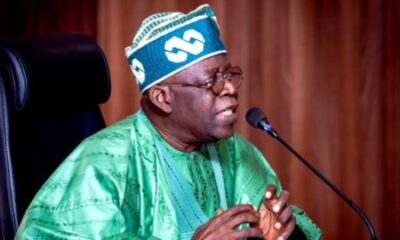
 BIG STORY3 days ago
BIG STORY3 days ago
 BIG STORY3 days ago
BIG STORY3 days ago
 BIG STORY2 days ago
BIG STORY2 days ago
 BIG STORY5 days ago
BIG STORY5 days ago
 BIG STORY4 days ago
BIG STORY4 days ago
 BIG STORY3 days ago
BIG STORY3 days ago
 BIG STORY3 days ago
BIG STORY3 days ago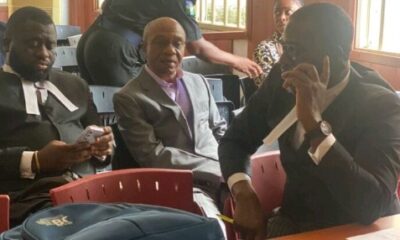
 BIG STORY4 days ago
BIG STORY4 days ago



